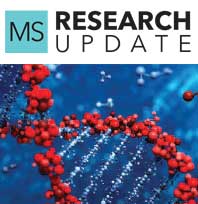Rebif® (interferon beta-1a)

In this Update
FDA-Approved Medications: Recently Approved
FDA-Approved Medications: New Data on Previously Approved Medications: Injectable Medications
Company: EMD Serono
- 22 mcg or 44 mcg injected subcutaneously three times per week
- Approved in 1996 for relapsing forms of MS
Previous: Gilenya® (fingolimod) | Next: Plegridy® (peginterferon beta-1a)
Rebif® is an interferon medication. Interferons are a group of proteins that signal the body’s immune system to respond to threats, such as a virus. While the exact means by which Rebif and other interferon-based medications exercise their therapeutic effects in multiple sclerosis is not known, interferons are among the earliest disease-modifying therapies (DMTs) used to treat MS.
A recent head-to-head comparison of Rebif and the oral disease-modifying therapy (DMT) Aubagio showed no significant differences between the two medications in terms of slowing MS disease progression over the course of two years.
A total of 932 patients with relapsing-remitting MS (RRMS) were started on Rebif or Aubagio, and were followed for two years regardless of whether they discontinued either medication. Relapse rates and lesion activity were measured during that period, and disability progression was calculated based on Expanded Disability Status Scale (EDSS) scores. Individuals who were pregnant or who had RRMS for 10 years or longer were excluded from the study.
After two years, the prevalence of disability progression was low but similar among both treatment groups (8.5% with Rebif vs 11.4% with Aubagio). The percentage of participants who suffered one or more relapses in two years was lower in the Rebif group (39.4%) than in the Aubagio group (49.2%). Also, a higher proportion of individuals in the Rebif group were free of disease activity over a given three-month period (73.1%) vs Aubagio (55.1%).
The researchers warned, however, that differences in baseline EDSS scores and past disease-free periods were not considered when the percentages were calculated, so the results are not definitive.54 Ultimately, individual response, patient preference, tolerability, and accessibility to medication go far toward determining which patients are best suited to a specific DMT.
Previous: Gilenya® (fingolimod) | Next: Plegridy® (peginterferon beta-1a)
